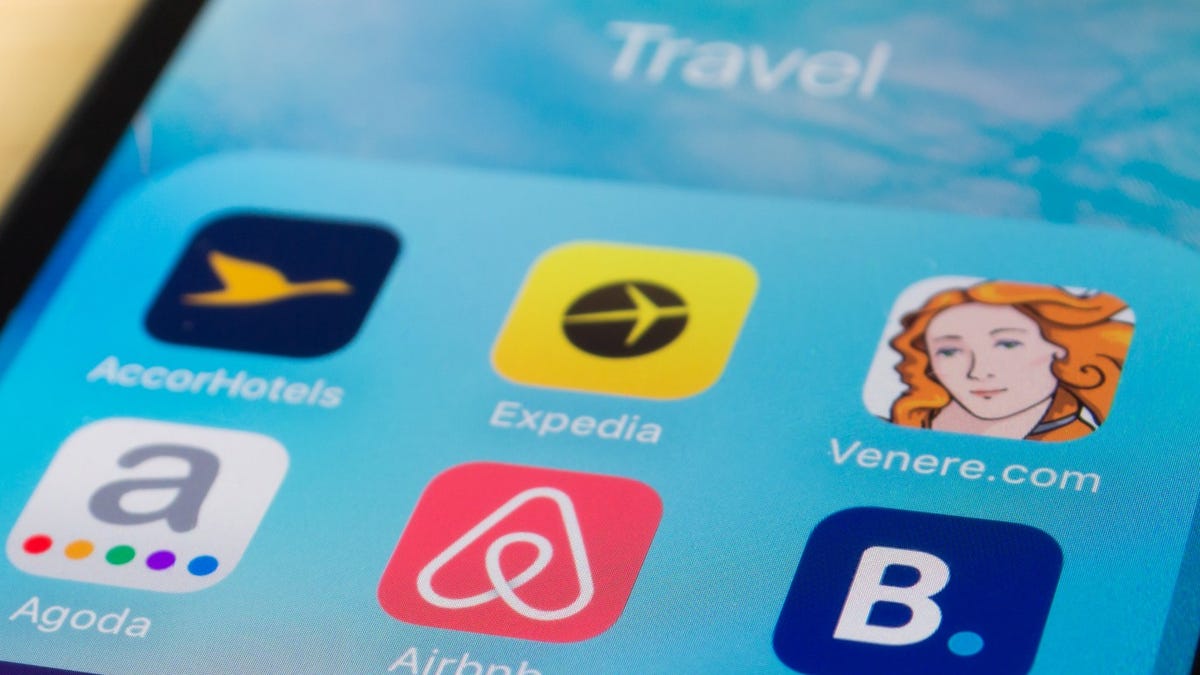- When travel plans go awry who is responsible for resolving the issue: the hotel or the third-party booking site?
- Many travelers struggle to ever get refunded and chase down their money for years.
- There is a lack of motivation for these companies to uncover areas that are short in services, says one expert.
“How to travel better” is a five-part series focusing on uncomfortable or inefficient travel experiences and how the industry can do better. If you’d like to contribute to our future reporting and share your experience as a source, you can fill out this quick form.
When Ginette Gosselin planned a family trip in March to Santa’s Village in Ontario, Canada, she never expected she’d have hundreds of dollars tied up after they returned home.
Hoping to find nice accommodations at a reasonable price, Gosselin browsed Expedia, which calls itself an online travel agency. She said she felt good about using the site since she had successfully booked through them before. She came upon a place called the Pinedale Inn in Gravenhurst, located in Muskoka. Although it was an older motel with a three-star rating, she was sold on the many four- and five-star reviews saying it was clean and comfortable.
“The photos made the place seem quaint,” her daughter, Paméla-Sophie Gosselin, said.
Ginette booked five nights in July for a total of $1,124.35 CAN (about $857.14 USD). The Inn had a 72-hour before check-in cancellation policy, which Gosselin felt was fine because she trusted Expedia and its reviews.
After an eight-hour drive to Gravenhurst from Kapuskasing, the family was ready to get to their room and relax. But when they arrived, they were stunned by the condition of their room.
How cruises work for plus-size passengers: ‘The worst part … is getting on the flight’
Is there a doctor on this flight? Why in-flight medical kits may not have everything a passenger could need in an emergency
“We immediately noticed how filthy the place was,” Gosselin said. “I mean disgustingly filthy.”
The family said they saw dried urine and hairs around the toilet, blood on the bedspreads and food on the walls. Despite the front desk attempting to give it another clean, the room still felt unacceptable to the family and they decided they couldn’t stay for their entire trip.
There was one problem: It was late at night and they couldn’t find other available accommodations.
“We had to tough it out,” Gosselin said. “The whole evening, I felt very uncomfortable.” The next morning, she went to the front desk to see if they would reimburse the rest of the trip, but they would only refund the last two days, for a total of $346.34. Gosselin decided to pursue the issue with Expedia.
“If it wasn’t for Expedia we never would have booked at this filthy inn, so I held them just as responsible as the inn,” she said.
Since the incident, Gosselin has spoken to three different Expedia customer service representatives over the phone and about six others via the chat function. She said she made it clear she wants reimbursement back to her mom’s credit card but was only given an additional Expedia credit of $325. Even then, Gosselin had to follow up on getting the points into their account.
“We didn’t want points because we had lost confidence in Expedia, therefore I was dealing with the situation with plans to never use their site ever again,” she said. “We never want to have to fight tooth and nail to get what is owed to us.”
Which day is the cheapest to fly? When is best to book? Google Flights data shows cost trends.
Cheap hotels: How to score the best hotel room prices online
Gosselin’s situation is not unique. She’s one of the many third-party booking site clients who jump through hoops to have their travel issue resolved. When travel plans go awry it can be confusing and stressful to figure out who is responsible for resolving the issue: the hotel or the third-party booking site.
Many people are told by the hotels that they cannot help, that it’s up to the booking site. People spend hours bouncing between customer service representatives from these sites and often end up paying out of pocket to complete their trip. Many struggle to ever get refunded and chase down their money for years, according to Facebook group Expedia Victims, where thousands of people share similarly negative experiences.
How do third-party booking sites work?
Third-party booking sites like Expedia, Priceline and Kiwi.com are meant to be one-stop shops for travel, offering package deals on flights, car rentals and accommodations. Travel suppliers like airlines or hotel brands post available inventory on Expedia as a “convenient way” people can book their trip.
Expedia works through two business models: a merchant model, where it facilitates the booking on behalf of hotels, and an agency model, where it acts like an agent for the travel supplier, but it is the supplier that charges customers.
Either way, when it comes to refunds, Expedia said the policy is determined by the airline, car rental company or hotel they partnered with.
“Regardless of the business model, terms and conditions and rules and restrictions for the booking are set by the supplier and not the OTA,” according to Expedia’s website.
“When something unexpected happens, our customer service agents are there to advocate on behalf of the customer,” an Expedia spokesperson told USA TODAY. “We can often resolve the issue but are limited by the policies set by our partners and not authorized to make exceptions on their behalf. If we make a mistake, we are committed to making it right.”
Expedia Group also owns Hotels.com, Hotwire.com, Orbitz and other travel-booking sites.
Another popular online travel agency, Booking.com said that it handles customer service on behalf of its travel partners, “allowing them to keep operational costs down and the ability to focus on doing what they do best: creating a great customer experience,” a Booking.com spokesperson said. Like Expedia, the booking terms and conditions are decided by the properties.
Part of Booking.com’s Booking Holdings, Priceline, said it partners with travel brands to feature discounted deals on travel plus exclusive offers for customers. The platform aims to be a “seamless experience” for customers, according to Jeremy Ellis, Vice President of Customer Care Operations at Priceline.
How are these sites helping customers when issues occur?
When things go wrong, Priceline, Booking.com and Expedia all say they will “advocate” on behalf of the customer to their travel partner, offering different modes of customer support.
The first step, as recommended by Priceline, is to work with the hotel during a stay to see if the hotel can resolve the issue in “real time.” Ellis said it’s easier than trying to fix an issue after the stay.
“If you encounter an issue or you’re not satisfied with your experience, we will help file complaints, compensation requests and submit documentation to be considered for policy exemptions,” Ellis said.
However, as many customers have shared in their complaints, even in-the-moment support from the travel agencies don’t typically result in immediate resolutions, especially if the hotel or airline isn’t cooperating.
“We know our customers are mobile and traveling around the world so we’re there for them regardless of whether that’s a phone call, a text, a Tweet or via a Facebook message,” he added. Priceline also has a chatbot feature.
Booking.com also aims to have accessible customer support, which is available 365 days a year, 24/7, and in 44 languages through its Help Center.
Expedia offers a 24/7 call center and mobile app for customers to contact a “virtual agent” when an issue comes up. “We are constantly working to make the traveler experience better,” an Expedia spokesperson told USA TODAY in an email.
During the pandemic, when many travel plans were disrupted, Expedia offered website and app updates to allow customers to cancel their trips in exchange for a voucher. They also added a new filter to show which accommodations are non-refundable and tools to help people check on their refund status.
A spokesperson for Kiwi.com, told USA TODAY that the pandemic forced a “complete change in processes” for flights booked by customers.
WHAT’S YOUR REFUND? How to find out exactly what’s owed to you when your flight is delayed or cancelled
“Even with our trained specialists working on cases and the hurried implementation of innovative refund automation this has been the biggest test ever on the goodwill of customers because the crisis was so huge and the delays to process so great,” the spokesperson said, adding that although “the majority of the pandemic backlog has been handled,” there are customers still waiting for refunds.
The future of third-party booking sites
For many customers, the support offered by these companies is not enough.
Nancy Snyder is a Pennsylvania-based woman who was traveling with her family to Milan in June for the open-road race Mille Miglia. She paid $3,058.41 for her airfare through Expedia. But after that booked flight was canceled and prevented her from checking into her returning flight, she spent over $3,718 out of pocket to buy new flights and Ubers. The airlines, Air Canada and United, couldn’t do much to help other than offer a flight that would have her in Milan two days late, she said.
Unhappy with her experience, Snyder contacted Expedia at least 100 times through calling and using the chat feature, she said, and kept getting a different agent, which was frustrating. About four weeks later, the company refunded her the money for her flights including her additional expenses. She swore she’d never use them again.
When asked what could have gone differently, she said: “They should’ve helped me, they should’ve gotten me on the flight (that day). But their staff was not equipped.”
Gosselin had similar feedback for Expedia.
“I wish they would have dealt with the situation accordingly,” she said. “They should have fought to get our money back from the inn, or just straight up paid things back instead of giving us the back and forth they did.” She said she wishes she didn’t have to speak to multiple agents, join the Expedia Victims page on Facebook and file a complaint to the Better Business Bureau.
Xinran Lehto, a professor in the White Lodging-J.W. Marriott, Jr. School of Hospitality and Tourism Management at Purdue University, told USA TODAY, that this is a main issue with these third-party booking sites, which she calls “technology-driven platforms.” These companies are so ubiquitous in the travel industry and here to stay, she said. Due to this, there is a lack of motivation for these companies to uncover areas that are short in services, and the result is a stressful, impersonal experience.
“The lack of human services can be a pretty severe hindrance to customer wellbeing,” Lehto said, adding that the “spirit of hospitality” or the “care element” is not there when it comes to these online travel agencies. The process should be made easier and more straightforward for customers.
“This is especially when there are urgent needs and varied or customized needs that may not be accommodated by a standard program,” she said, just like Snyder’s situation. She suggests these companies should hire more people and empower them to make changes customers need, as well as improve integration with their suppliers.
“They should really make the companies more human, to be honest,” Lehto said.
After over a month since filing a complaint with Expedia, the Gosselins have finally been refunded for their stay at the Pinedale Inn and given a voucher to use on the site for later bookings. Expedia is conducting an investigation into the motel. But for now, Gosselin said she will never book through them again.


Comment (0)